The Castle Doctrine is probably one of the most cynical and brutal games I’ve ever played. I bought it for a few reasons: the premise sounded fascinating, it’s by Jason Rohrer who was responsible for Passage, Sleep Is Death, Inside a Star-filled Sky and Gravitation (amongst others), and it was 50% off and due to go full price a few days later to coincide with the game’s release. According to Rohrer the game will never go on sale again so it was as good a time as any to check it out.
It’s a rough game to start though, and if you don’t know what the game is about then stick with me here, you’ll be perfect to illustrate this to.
Let’s assume that, like me, you visited the game’s website first and got this:
The Castle Doctrine
A massively-multiplayer game of burglary and home defense by Jason Rohrer
Followed by a quote from RPS:
And this:
I skimmed over the RPS articles, watched the terrifically menacing trailer above and felt ready to take on the game so I bought it, downloaded it, fired it up, created an account and stared blankly at this screen for a while:
Eeesh.
Okay, so I need to protect my vault while still being able to access it myself. I also need to protect my family while maintaining a clear route to the exit so they can escape if they see an intruder. I have $2000. I start looking at the build screen which displays all the types of defences you can deploy: walls, electronics, switches, doors, windows, pits, trapdoors, electric floors, pitbulls, chihuahuas, cats and a shotgun which appears to be for my wife. Some of these things are self-explanatory; doors block vision, walls block movement, power sources provide electricity, wires carry it etc. But it’s not initially clear what windows are for, or pits, given how expensive they are. And what the hell is a voltage-triggered inverted switch? What do cats do? What’s a panic switch for? What’s the difference between concrete and steel walls, besides cost? Do they have built in power conduits or can I only use wired wooden walls for carrying electricity? There’s nothing in the game to help you with these things, so you’ve either got to search the wiki or the forums to find out exactly what they’re used for, or try and work it out yourself. I suppose it’s no different to the likes of Minecraft and Terraria where detailed information can only be found outside the game but it does irk me that there are no tooltips or brief descriptions or pointers of any kind within the game itself. At least the game is always windowed so I don’t have to ALT-tab out all the time.
There are other questions too like: how do electronics work? What are some of these tools for? How do I back out of a self-test? (Obvious once you know how, but not clear from the offset.) What do I lose if my family are killed? Are they good for anything? What’s wrong with me? Why am I asking these awful questions?
After Rohrer’s Passage I expected my wife and two kids to be more of a hindrance or liability, and I wasn’t far from the truth.
Your wife carries half the money in your vault as well as half of any ‘bounty’ (money and tools) she’s acquired from killing intruders herself (using the shotgun mentioned above). The game doesn’t explain this to you. But what’s interesting about this dynamic is that, with a bit of forethought and planning, you can essentially divide where your money is stored in your house between your vault (which is stationary) and your wife who will try and escape and possibly kill the intruder en route (or be killed herself) and pocket more bounty. Your children on the other hand are just potential targets, defenceless and of no ‘use’ or ‘tangible’ value to you. Ick, that’s not nice to write. If an intruder kills any of them and the rest of the family see the body (or bodies), then they’ll stop trying to escape and mourn their death. On The Castle Doctrine forums there’s a frequently asked question:
Q. Why do they kill the children?
A. Because they are bastards.
See what I mean about this game being cynical? Nevertheless, I didn’t want them to die a tiny, brutal, pixellated death.
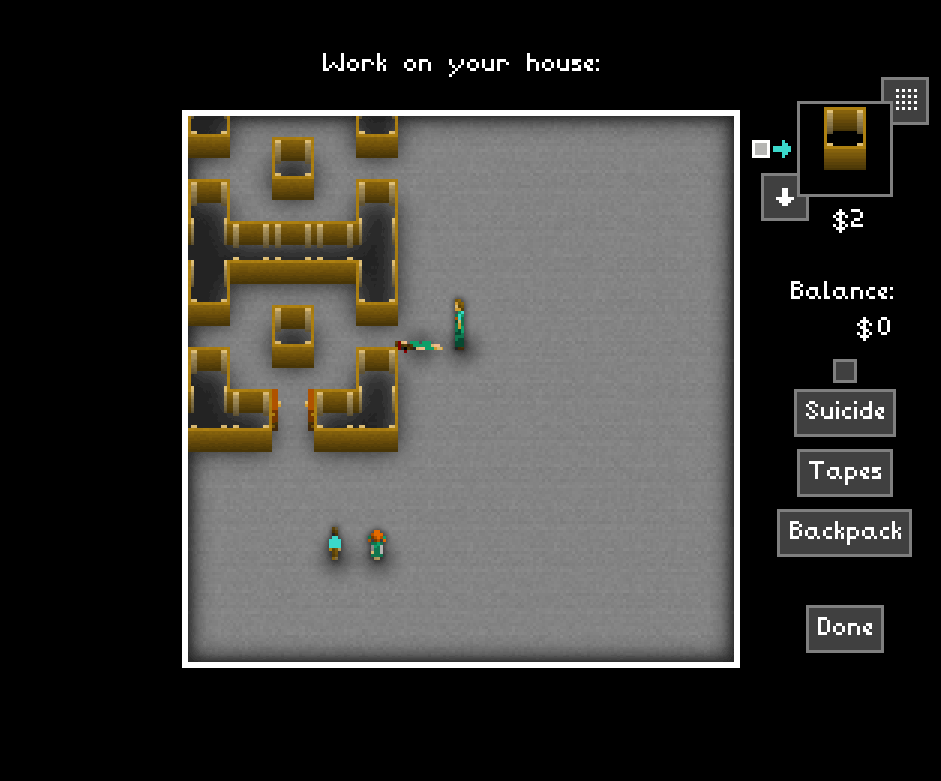 There are two ways of ‘prospering’ in The Castle Doctrine: robbing others, or by killing them in your death trap of a house. The first thing you’ve got to do is secure your home because you’ve got a family and $2000 burning a hole in your pocket. Unfortunately $2000 won’t go far. Pitbulls cost $320 each and your wife’s shotgun costs another $320. Everything else soon adds up. Then consider that if you spend all your money then nobody will want to rob your house (because there’d be nothing to gain) and if nobody’s robbing your house then nobody’s being killed in it to drop bounty which can then go towards better defences and tools to rob others to gain more money to… you get the idea. It’s dog eat dog, and there are a whole lotta dogs out there. Pitbulls specifically.
There are two ways of ‘prospering’ in The Castle Doctrine: robbing others, or by killing them in your death trap of a house. The first thing you’ve got to do is secure your home because you’ve got a family and $2000 burning a hole in your pocket. Unfortunately $2000 won’t go far. Pitbulls cost $320 each and your wife’s shotgun costs another $320. Everything else soon adds up. Then consider that if you spend all your money then nobody will want to rob your house (because there’d be nothing to gain) and if nobody’s robbing your house then nobody’s being killed in it to drop bounty which can then go towards better defences and tools to rob others to gain more money to… you get the idea. It’s dog eat dog, and there are a whole lotta dogs out there. Pitbulls specifically.
Now, as mentioned above, your family require a clear path all the way to the exit. Well, I say ‘clear’, pitbulls and panic buttons are the only things that don’t count (this isn’t explained either). Think about this dynamic for a moment. They need a clear path. This makes defending your family very difficult because you can’t put any doors, trap doors, pressure plates, electric floors or any other physical obstacle between them and the exit. If they see the intruder they need to be able to get out.
Now imagine you’re an intruder in someone else’s house. You can risk going for the vault which will likely be behind numerous traps and hazards or you can track down and risk the ‘clear path’ to the family, notably the wife, to bag half the cash and any bounty she’s carrying as well. In a secure house, either pursuit should be a death sentence but it’s never easy to tell what’s safe and what is isn’t. But that’s half the fun and most of the trouble.
When you’re robbing someone’s house you almost always have to be prepared. You can pack saws to cut through walls, bricks to hold down pressure plates, drugged meat to sedate pitbulls, ladders to traverse pits, wire cutters to, uh, cut wires, bottled water to frazzle electronics, clubs to biff dogs and put down the wife and kids (if you’re into that kind of thing), pistols, explosives, blow torches, door stops. The problem is, these tools can be expensive and, rather bizarrely, you ditch your backpack if you leave a house so there’s this crippling tension between leaving the house before you die wasting all the tools you were carrying, and pushing further to utilise your tools and dying in the process. It’s horrible, and I haven’t plucked up the courage to do it myself yet. I’ve made plenty of tool-less attempts, sure, and been caught out numerous times, but blowing my cash on tools to risk cracking a house that’s clearly armed to the teeth is another matter entirely.
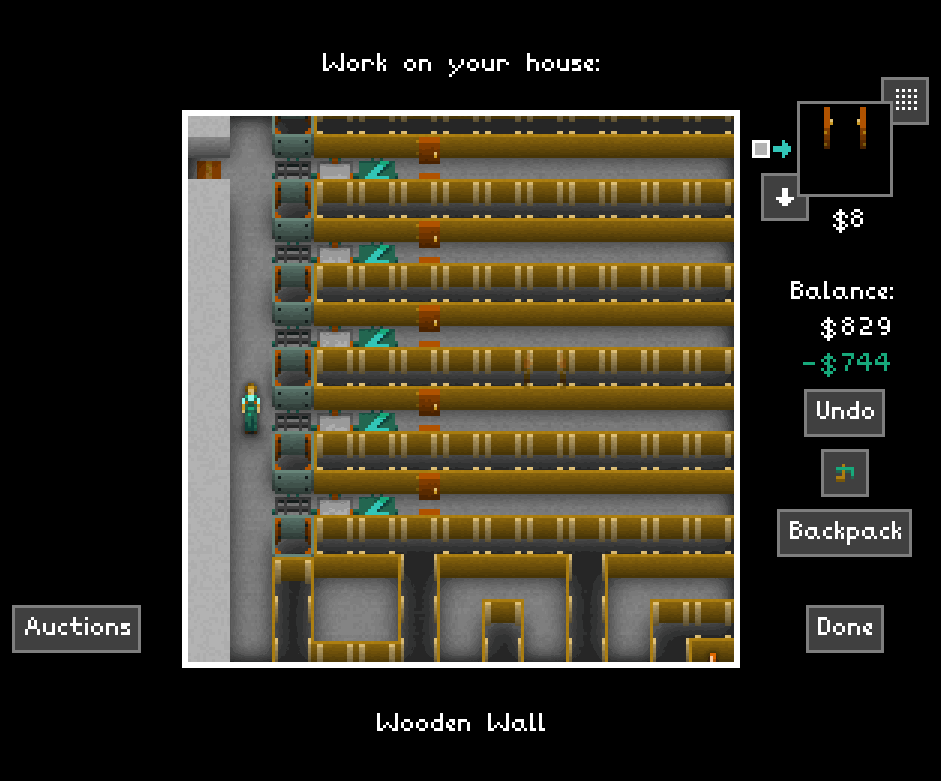 My first successful security system involved a series of intimidating one-way corridors (one of the most common, simple and primitive ideas — hey, it worked). Each corridor had an electric floor panel in the entrance followed by a sticky pressure plate connected to a power source. Walking over the pressure plate would charge the electric floor effectively trapping the intruder in. Beyond the power sources I fitted doors as well so that players couldn’t see what was on the other side. Would it be the vault or a pitbull? (At first, I couldn’t afford more than one pitbull so the doors were a cover.)
My first successful security system involved a series of intimidating one-way corridors (one of the most common, simple and primitive ideas — hey, it worked). Each corridor had an electric floor panel in the entrance followed by a sticky pressure plate connected to a power source. Walking over the pressure plate would charge the electric floor effectively trapping the intruder in. Beyond the power sources I fitted doors as well so that players couldn’t see what was on the other side. Would it be the vault or a pitbull? (At first, I couldn’t afford more than one pitbull so the doors were a cover.)
Wily players knew not to risk going over the pressure plates without the right equipment so instead they looked for the clear route to my wife, Denise. I fashioned a bend so that players would inadvertently walk past a window out of sight with a pitbull on the other side. The pitbull, on seeing the intruder, would then cut them off should they decide to double-back. Round the next corner would be Denise toting her shottie. I hoped it would be enough, and it was, for a spell.
The Castle Doctrine has this really, really cool ‘security tapes’ feature which allows you to watch recordings of people trying to rob your house. Watching intruders’ movements is tense and fascinating, and the more you watch the more you get an idea of what puts them off and what pulls them in. You’ll spot trends and tendencies and think of ways of capitalising on them. If you’re wanting to bag some bounty you’ve got to be able to play intruders and lull them into a fall sense of security, tempting them deep enough into your maw before clasping it shut around them. Too tight and they’ll back out, too loose and they’ll slip through.
Two or three hopefuls were killed by Denise but because I wasn’t around to reinvest the bounties into extra defences, namely a few more pitbulls to block the corridor in front of her, and because those bounties were stacking up in my vault (this makes your property look far more attractive to prospective reappropriaters), one intruder got through with a pistol and spotted Denise before she could close the distance to shoot. Ruben Sean Jones. I wanted to pay his house a revenge visit so I did a quick name search to try and find him in the neighbourhood but he was gone. Presumably he died in someone else’s house.
Low on cash and in dire need of some pitbulls, I decided to look for a fresh property to rob. Gotta break an egg to make an omelette, right? I spotted a household that had had no break-ins and was hiding away some $1600. Probably not much spent on defences there– well worth the risk. I carefully scouted the corridors and before long I found the family and the vault with no opposition. Easy pickings. I left the wife and plundered the vault. Sorry Mr.
With more money I tightened up my security and kept watching that deceptively innocent looking corridor lure intruders to their death. By the end of the weekend 24 people had died trying to rob my house. Some got munched on by pitbulls, some got electrocuted, and some just killed themselves when they realised there was no escape. Seriously, I’ve never seen so much suicide in a game. This guy killed himself on my welcome mat with $4100 in his pocket:
I watched security tape after security tape, cackling with each death, watching the bounty roll in. But intruder 25 caught me off guard. I pressed play on the tape and watched him dash straight down one of my one-way corridors. ‘Hah!’ I thought. ‘Say hello to Jugular the pitbull.’ But he didn’t run back, or throw drugged meat at the pitbull, he just coolly sawed through the wall into the next corridor where another pitbull awaited. Unphased, he did the same again and kept going until he arrived in a corridor without a pitbull staring him down. Bingo. The vault. He’d done this before.
Because my wife was dead, all the money and tools I’d amassed from dead intruders was in the vault. The bastard had struck gold. I was broke, and my corridors were full of holes. Gah. At least the holes were out of sight behind the doors.
Whenever your house changes state in The Castle Doctrine, whether something is added, removed, repositioned or damaged, you have to be able to reach your vault without any tools as part of a ‘self-test’ to ensure that it is still ‘fair’ to other players. So you remember me saying that you have to be prepared when you’re robbing houses? Well, technically speaking it’s possible to reach everyone’s vaults without using a single tool but… yeah, good luck with that. Without completing a self-test, you can’t browse the neighbourhood to rob others or commit any alterations you make to your security. When you’re working on your house, pets and electronics are inactive so it’s not possible to fall foul to your own defences, but when you’re self-testing it’s all real and pitbulls will chase you down, electric floors will electrocute you, pits are capable of breaking every bone in your body and presumably your wife will shoot you (because you’re dressed like a looter), but I haven’t dared test that yet.
My house had obviously changed since my vault had been compromised so before I could catch any more intruders to pay for the damaged walls, I had to do a self-test. I’d done this plenty of times before so I carefully counted the corridors, found the right one and bolted down it towards the vaul– oh shit.
Jugular, what are you doing here?
My house had changed and the pitbulls were still where they were when I’d been cleaned out. I was trapped, and moments later I was pitbull bonemeal.
The Castle Doctrine has some oddities because, while there’s a very particular dystopian and unsettling reality to it all, plenty of abstract concessions have been made to keep the game balanced and ‘enjoyable’, for want of a better word. For instance, you don’t know the name of your character so it’s very difficult to cheat with multiple accounts. As mentioned above, without self-testing you can’t change your house set up or browse the neighbourhood to rob other properties, so you have to play fair to really play at all. The amount of money in a property is advertised to the neighbourhood, as well as how many have died trying to steal it, this ensures players can make reasoned decisions before entering a property. (I can only imagine how deflating it would be to bust through someone’s defences using a backpack full of expensive tools to find 40 bucks in their vault.) You ditch your backpack when you leave someone else’s house so this front loads the risk of a heist. Intruders can saw through walls faster than pitbulls can chase them, dog damnit. Dying whilst robbing a house puts that property on a ‘chill’ list which prevents you repeatedly re-entering it and death-cheesing one household. Family members can’t walk through doors or over pressure plates, or even over wires. There’s no house layout save utility for quick construction, so every time you start again, you start from scratch; this gives death some bite seeing as most of your time is spent designing and maintaining your security systems. They’re all quirks, but they make sense, and are ultimately what make the game so tight and crisp, even if they’re not explicitly explained or justified.
So it’s perhaps even weirder that you can only ever play as a guy, with a wife, son and daughter. Sure, every time you restart, you and your family’s appearance and names change, but with every fresh start you’re always part of the same nuclear family; you’re always the man of the house– the defender, the looter, the murderer. Your wife can kill, but she’s usually resigned to waiting down a corridor somewhere hoping not to get killed and looted herself. If your family get killed then your house is a lot easier to defend because you don’t have to leave a clear path anywhere– you can literally put traps right up to the welcome mat. You’ve got a lot more to lose and protect with a wife and two kids. Hermits have the best shells.
I’m not sure what to make of this though, because, while I acknowledge that Rohrer’s Passage and Gravitation were very short, self-contained personal works, here the experience is much more expansive, inclusive and conversely owned by so many people in the same virtual space. I’m aware of the game’s inspiration but is everyone supposed to assume or relate to the role of Jason Rohrer, the husband, father and guardian? It just seems like a strange thing to impose for an MMO. There are clear themes of security paranoia and self-defence being as dangerous to you as it is to others at the heart of The Castle Doctrine, but I think these come through wonderfully without the nuclear family setup. From the game’s wiki:
As a house becomes more thoroughly constructed and the traps more intricate and interdependent […] the only option left is to do a straight run-through of a completely constructed house. You must become accountable for your own safety in this event, and take the time to double-check the elements of your security system, or run the risk of carelessly losing all of the money, time, effort, and creative ideas which went into your security system’s construction. Be careful!
The Castle Doctrine’s a nastily cyclical game that’s easy to get caught up and one that quickly spirals out of control. Once you’ve secured your house as best you can with your $2000, you’ll be dropping in compulsively to watch security tapes, hoping that your carefully laid out system will have trapped and killed any intruders for bounty that can be reinvested in defences or used to buy tools for a heist or simply left in your vault to bait more looters. More will certainly come; some will leave and never come back, some will never leave, some will scout your household out, leave and come back later with the right tools for the job. (I keep a list of possible ‘soft’ households to rob but I’m yet to act upon them.) No matter how well defended you think your home is, there’s always a bigger fish. You’ll have epiphanies away from your computer and want to iterate on your designs after near-misses, but all that costs money so you’ll start bottom feeding– going for the seemingly weak houses for that quick fix. You might get lucky. You might die and lose everything. Sooner or later you’ll want revenge and the chances are, it’ll kill you. You’ll see honour in robbers who steal everything but leave your family, pets and property untouched. You’ll die self-testing and hate yourself for it.
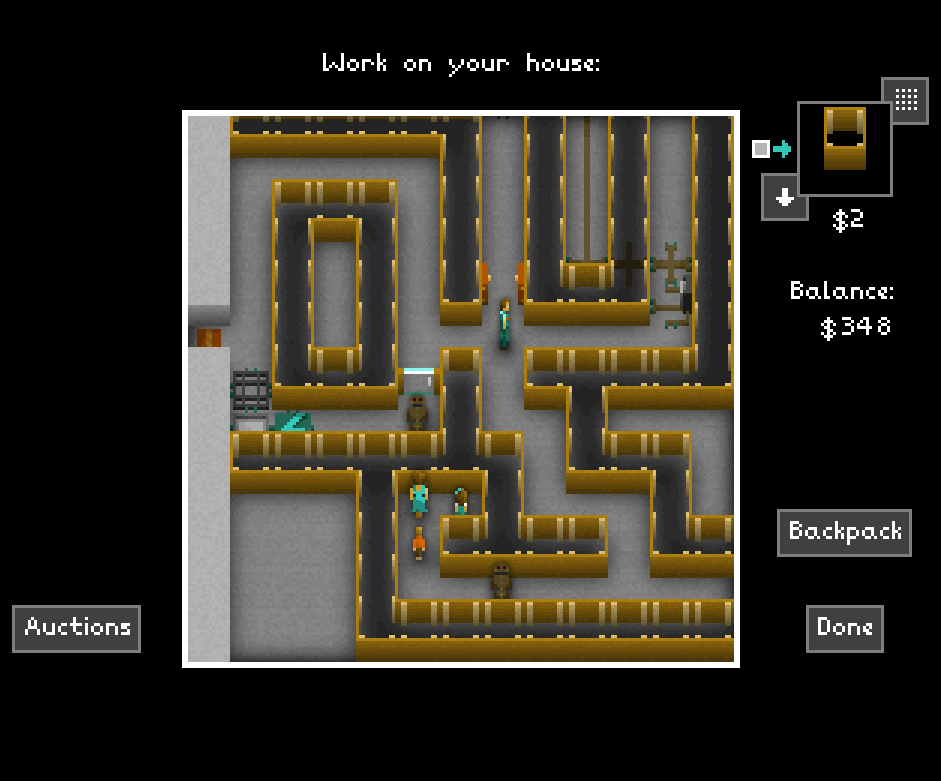 But the real sting in The Castle Doctrine’s tail –the real poison– is when your house is killing looters and racking up bounty (just as you intended) when you’re away from the game. That money –that bait– starts to add up. And bigger bait attracts bigger fish. Stay away from the game too long and it’ll be curtains for you sooner or later so it’s in your best interests to log in and keep reinvesting any extra money into security, not only to keep that bait small but to make sure your defences are robust and clever enough to withstand the inevitable tool-assisted heists. Only the other day, while I was out (in real-life), somebody walked into my house (in-game) with $24,000 and died. I would have been stinking rich but unfortunately that sum of money attracted Captain Tool who effortlessly cleared me out with only a couple of drugged meats. At least he didn’t kill anyone or anything, or vandalise my property.
But the real sting in The Castle Doctrine’s tail –the real poison– is when your house is killing looters and racking up bounty (just as you intended) when you’re away from the game. That money –that bait– starts to add up. And bigger bait attracts bigger fish. Stay away from the game too long and it’ll be curtains for you sooner or later so it’s in your best interests to log in and keep reinvesting any extra money into security, not only to keep that bait small but to make sure your defences are robust and clever enough to withstand the inevitable tool-assisted heists. Only the other day, while I was out (in real-life), somebody walked into my house (in-game) with $24,000 and died. I would have been stinking rich but unfortunately that sum of money attracted Captain Tool who effortlessly cleared me out with only a couple of drugged meats. At least he didn’t kill anyone or anything, or vandalise my property.
Then there was another time where I blew all $2000 of my starting money on security and days later I’d had no intruders. Well, okay, one, but he cleared off at the first sign of trouble. Why was nobody trying to rob my house? It was because there was nothing to gain by doing so. And that’s the thing: the only winners in The Castle Doctrine are those who choose not to prosper, who choose not to chase money and play the game by spending enough to render any temptation to loot them moot. And while there’s always suicide, you’ve got a family to imprison in a sterile labyrinth of death and despair.*
The Castle Doctrine’s a mean cocktail then, one spiked with permadeath. As a defender it’s a psychological trapping game for evil geniuses and cruel dungeon masters. As a robber, it’s a fiendish roguelike with no randomness; a deadly puzzle to crack; player versus player Monaco without a drop of mirth or forgiveness. It’s a deceptively layered and nuanced gambling game that can be as demoralising and infuriating as it can be satisfying and surprising depending entirely on yours and other players’ actions. But it’s a game that always bites and as such one that a lot of people will shy away from.
To contact the author of this twaddle, email greggb@tap-repeatedly.com
* There’s nothing homely about the virtual spaces of The Castle Doctrine. There are no bedrooms, lounges, bathrooms, kitchens, dining rooms– nothing, just corridors and killrooms. What a life eh?


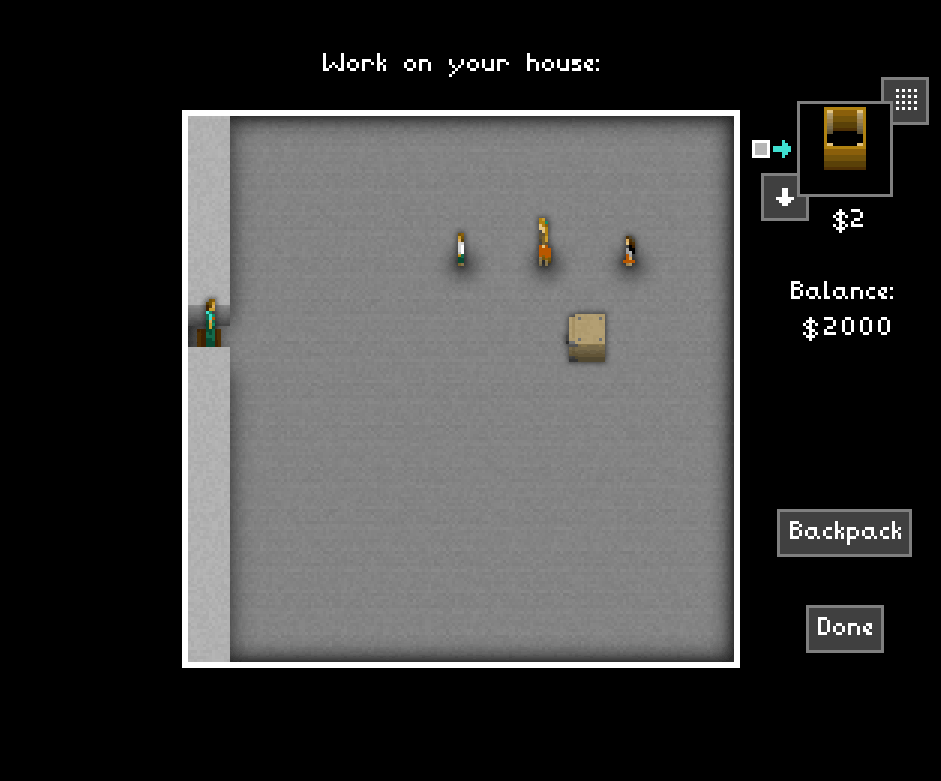
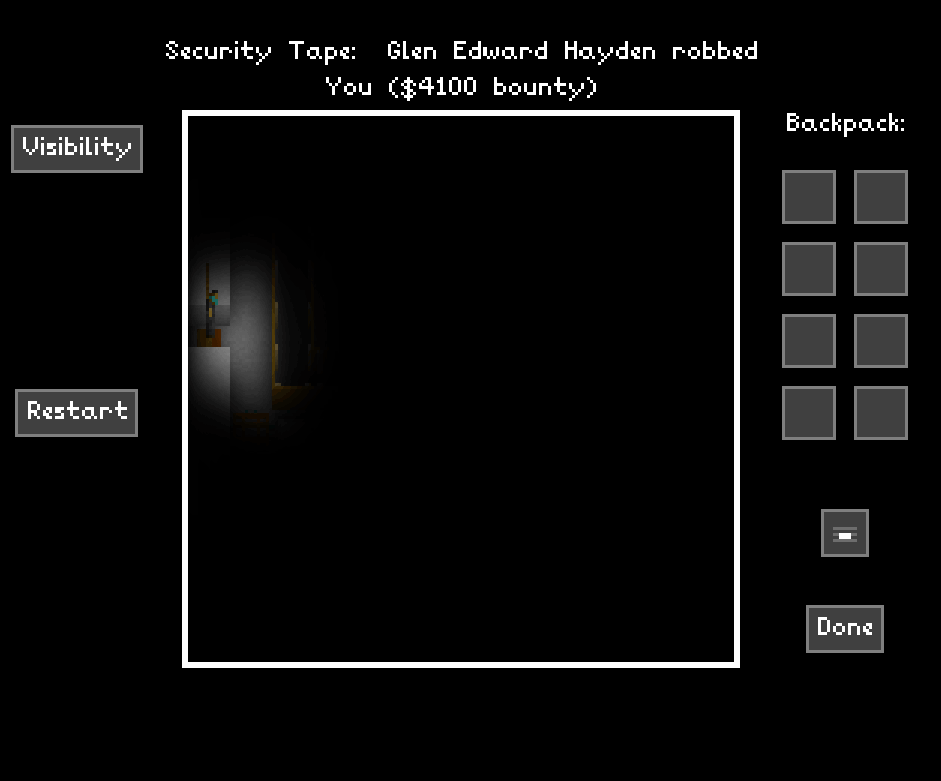
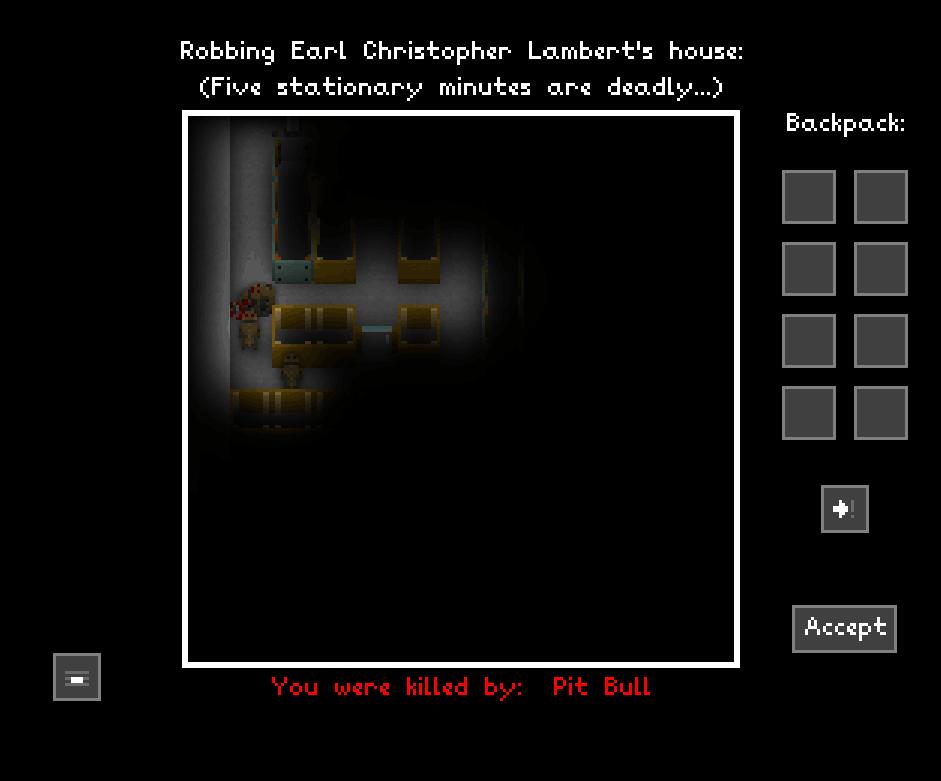
Nice blow by blow take on the game, Gregg. So permadeath is a thing for your character and your family, is that right?
This sounds like a really interesting game, and I’m glad to hear that the premise is handled like the black satire it seems to be. Sinister stuff.
Yeah, if you, your wife or kids get killed, it’s permanent. If any pets get clubbed or drugged, or walls get demolished, or electronics frazzled, or doors wedged open, or windows smashed etc. and the looter fails to reach your vault then your security gets reset and it’s happy days. Nothing lost, plenty to gain. If they manage to reach your vault then that shit’s permanent yo, and, chances are, it’ll be difficult to recover (because you’ve got no cash to repair stuff and self-testing might be more dangerous because your security system has been altered by the looter).
I’ve spent quite a while on the Steam forums reading through various threads, listening to people moaning and whining about the game mechanics — I find it fascinating — but poor old Jason is in there trying to explain why this isn’t like other games, let alone other MMOs. A lot of people don’t get it so they’re asking for things that go against the very reasons the game is how it is. They’re seeing very deliberate design decisions as bad design.
I remember at uni on my graphic design course making a typeface GIGANTIC on a presentation and the lecturer telling me to ‘watch the size of your text’ as if I’d accidentally made it huge. It was just… bewildering and insulting because it was so blatantly by design.
The thread I was particularly interested in (and infuriated by) was this one: http://steamcommunity.com/app/249570/discussions/0/540732347310827878/#p1
This comment from Rohrer I really liked:
“It is NOT a game that I intended any one person to play and play forever. There’s a lot to learn here, and a lot of different feelings to experience, and quite a few “fresh” feelings that you haven’t felt in a game before, but it is not padded out with filler to “keep you playing” like a rat on a treadmill. Once you get all there is for you personally to get from the game, it’s good to move on.”
It’s so refreshing to hear a developer say that about their MMO. Over the weekend I think I came to the end of my time with The Castle Doctrine, at least for the time being (it’s quite an intense game) and I’ve clocked 16 hours or so with it, which isn’t bad given how unsure I was about it at first.
This is fantastic. You seem to ‘get’ Jason Rohrer, Gregg, to the degree that anybody can ‘get’ him, and I appreciate that in forum posts he seems to ‘get’ himself as well. The vast majority of his games are meant to teach a lesson or explore a single theme, after which you’re expected to move on.
Based on your writings, The Castle Doctrine reminds me of Defcon. The winner is the one who loses the least, but that’s always a lot, and you’re always going to be frustrated if you approach the game with the wrong mentality.
Rohrer’s games aren’t for everybody, but I think he’s hurting himself with some of the limits he places. This is the second time a Tap writer has pointed out that one of Rohrer’s games is limiting in a specific, off-putting way – male lead, nuclear family – and you can’t help but wonder whether it would’ve been a richer, more personal experience if someone had been able to choose to play as a hermit, or a woman, or a childless family, or whatever.
That must have been a tense, depressing weekend you had. Thanks for putting yourself through it!